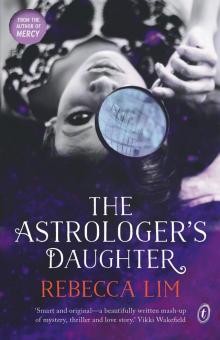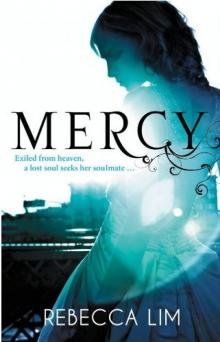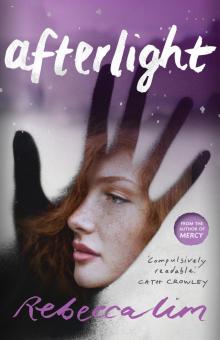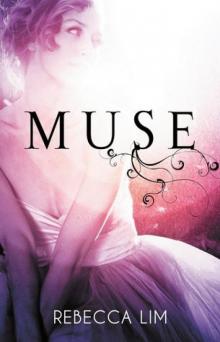- Home
- Rebecca Lim
Mercy m-1
Mercy m-1 Read online
Mercy
( Mercy - 1 )
Rebecca Lim
An electric combination of angels, mystery and romance, MERCY is the first book in a major new paranormal series.
There’s something very wrong with me. I can’t remember who I am or how old I am, or even how I got here. All I know is that when I wake up, I could be any one. It is always this way. There’s nothing I can keep with me that will stay. It’s made me adaptable. I must always re-establish ties. I must tread carefully or give myself away. I must survive.
Mercy doesn’t realise it yet, but as she journeys into the darkest places of the human soul, she discovers that she is one of the celestial host exiled with fallen angel, Lucifer. Now she must atone for taking his side. To find her own way back to heaven, Mercy must help a series of humans in crisis and keep the unwary from getting caught up in the games that angels play. Ultimately she must choose between her immortal companion, Lucifer, and a human boy who risks everything for her love.
Rebecca Lim
Mercy
To my husband, Michael Liu,
who makes it all possible.
With love always.
Chapter 1
There’s something very wrong with me.
I can’t remember who I am or how old I am, or even how I got here. All I know is that when I wake up, I could be any age and anyone, all over again. It is always this way.
If I get too comfortable, I will wake one morning and everything around me will have shifted overnight.
All I knew? I know no longer. And all I had? Vanished in an instant. There’s nothing I can keep with me that will stay. It’s made me adaptable.
I must always re-establish ties.
I must tread carefully or give myself away.
I must survive.
I must keep moving, but I don’t know why.
I am my own worst enemy; that much I’ve figured out.
You know almost as much about me as I do.
I look sixteen. Sometimes I even feel it.
Me? The real me? I’m tall. Though I only have a sense of that.
I’m pale, like milk, but I never get sunburn. Don’t ask me how I know this, seeing as I don’t seem to occupy any physical space at the present time, but I just know.
My hair is brown. Not a nice brown or an ugly one, just brown. It’s weird, but it has no highlights. It’s all the same colour, every single strand straight, even and perfectly the same. It hangs down just past my shoulders and frames my face nicely, which is oval and okay, I suppose. I have a long, straight nose, lips that are neither too thin nor too wide, and perfect eyesight. I can see for miles, through sunshine or moonlight, rain or fog. Oh, and my eyes? They’re brown, too. And I never feel the cold, ever.
When I look in the mirror, I see this face — mine, I have learnt to recognise it, a palimpsest of a face, a ghost’s face — within another’s, a stranger’s. Our reflections co-existing. I am her and she is me, and we, together, inhabit the same body.
How is this possible? I do not know. We are two people with nothing in common, nothing that ties us together, except that I am currently the reason she — whoever she is — can talk and move and laugh, go through the very motions of her life. I am like a grave robber, a body-snatcher, an evil spirit. And she? My zombie alter ego who must do as she is told.
If I think hard about myself, really hard, I get the one word: Mercy. It’s what I’ve taken to calling myself for want of something better. It might even actually be my name, but your guess is as good as mine.
My only real solace? Sleep. In the absence of an explanation for anything, for everything, I live for it and what it can bring.
Though I seem continually reborn, in this fogbound life I still have a kind of compass, a touchstone. He reminds me to call him Luc and appears to me only in my dreams.
His features are more familiar to me than my own.
For I have traced them in my head and with my heart, such as it is. And perhaps once — though memory can be a treacherous thing — even with my hands when they were real, made of flesh and bone and blood and not of the insubstantial air.
He has hair of true gold cropped close, with sleek, winged brows of a darker gold, pale eyes, golden skin. He is tall, broad-shouldered, snake-hipped, flawless as only dreams can be. Like a sun god when he walks. Save for his mouth, which can be both cruel and amused. He tells me not to give up, that I must keep searching, find him.
That one day it will all make sense. And all this? Will have seemed merely a heartbeat. An inconvenience.
‘I am only a little ahead,’ he laughs as we sway together on a narrow precipice, high above a desert valley floor, the whole sleeping world spread out before us. ‘A little ahead.’ His hand is steady beneath my elbow. If he were not here, I would surely fall, and even in dreams, die.
Though my true name always eludes me — like him, it is always just a little ahead — my fear of heights does not.
Why this is, again, I do not know.
As always, Luc warns of others looking for me: his erstwhile brothers, eight in number. That if They find me, They will destroy me. And that save for him, They are the most powerful enemies one may have in this world.
‘If They catch you,’ he cautions, ‘They will surely kill you. And that, my love, is no dream.’ He whispers these awful-beautiful things with his familiar half-smile, before light seems to bleed from him for an instant. Then he is gone.
I wake with his warnings in my ears.
I wake now, sitting upright in the back of a bus packed with screaming, gossiping girls in matching school uniforms.
As I look down at the grey and dark red weave of the skirt I am inexplicably wearing, I wonder what disaster I am headed for as I try to figure out who the hell I am supposed to be today.
Chapter 2
‘Carmen? CARRRRRMEN!’ My ears ring with the word, with the operatically rolled R s, the sonic after-bite.
I lower my head sharply and peer through an unfamiliar fall of black, curly hair. Momentarily disorientated, before I realise suddenly that it is mine.
The racket is emanating from a sharp-faced, pigeon-chested blonde hanging over the seat back diagonally across the aisle from where I am sitting. I press my knees and hands tightly together to stop them from shaking.
So today, I suppose that must be who I am. Carmen.
And the thought that I am no longer Lucy, or Susannah, or even the one before, whose name I can no longer remember, but whose life I liked very much and could have kept on comfortably living, makes my world spin, my breathing grow dangerously fast. I can feel the colour draining out of Carmen’s face as I fight for control of her body.
Everything is suddenly too loud, too bright, dialled up by a thousand. Carmen’s heart feels like it will explode in her chest — ours — and if it does, it will be my fault and I will be forced immediately to quit her lifeless body and take residence — like a ghoul, like a vengeful ifrit — in someone else.
Really, I should know what to do by now. You’d think I’ve had enough practice. But it never gets any easier. Not in those fateful first few days and hours, anyway.
I force my breathing to slow, and focus with difficulty.
The muscles of Carmen’s neck, her face, refuse to do as they are told. I am drenched in sweat, sure that Carmen’s features are flushed with a strange, hectic blood.
Whoever the blonde is, she can see my clumsiness, the sudden wrongness in Carmen’s expression, her demeanour, because the blonde’s look sharpens, her already shrill voice rises an octave and she shouts, ‘What’s wrong with you today, you dopey bitch? Jesus, you’ve been acting really weird. Like, hello? Is anyone in there for, like, the fifteenth time? Don’t you want to know who Jarrod Daniels is doing now?’ And the wh
ole coach falls silent, every head turning our way.
Dopey bitch? With those two words I feel Carmen’s heart kick into even higher gear, almost whining under the strain of my sudden, white-hot anger. I have a temper then; that’s interesting to know.
Inexplicably, my left hand begins to ache dully, and I cradle it inside my right elbow, against my side, as if I have been recently wounded. Carmen’s skin is now so hot that I know for certain that if I allow this to continue, I will kill her. And she is innocent and that cannot happen. It is as if an edict has arisen in me that I am currently powerless to fulfil.
In the strange manner I sometimes have of taking in too much, too quickly, I register in a split second that there are nineteen other girls present, two teachers — both female, both on the wrong side of old, one with short, iron-grey hair, jangly earrings and a hard face, another with a girly bob and meaty jowls — and a driver who is consumed by the black fear that his wife is about to leave him for another man. It hangs about him like a detectable odour, a familiar on his shoulder, gnawing at his flesh. Is it only me that can see it?
Then the world telescopes, narrows, grows flat, becomes less than the sum of its parts again. Carmen’s heart slows, her breathing evens out. My left hand has ceased to ache and I release it, sit straighter.
Still every eye in the bus is turned on us. Are ‘we’ friends? Who is she to me?
Still struggling to get Carmen’s face under control, I slur, ‘Bad migraine.’ In my last life — well, Lucy’s — I got migraines all the time. For someone like me, who doesn’t feel the cold and never gets sick, not the essential me anyway — it had felt like intermittent war breaking out in my head.
As if Lucy’s mind and body kept finding ways to turn on me, determined to finish me off. I don’t miss being Lucy, though I wish her well and hope she’s recovered from my casual trampling upon her life. No doubt, in time, I will forget her, too.
My weak response is enough to satisfy them all, because eyes swing away uninterestedly, the noise level in the bus climbs back up to a jet-engine roar in my ears, and the sharp-faced blonde snaps, ‘That’s so retarded,’ before turning huffily to speak to somebody else and leaving me blessedly alone.
Like a facsimile of a human being, I turn awkwardly to face the window and discern farmland flying by beneath an iron sky, punctuated by dead trees and outbuildings, the occasional chewing cow, ordinary things, the grass by the roadside growing taller and coarser the farther we travel. Red soil gives way to sandy verges, vast stretches of salt plain. I imagine I can smell the sea and wonder where we are. Not Lucy’s domain of smelly high-rises and disgruntled pushers on skateboards. Not Susannah’s toney mansion with the round-the-clock, live-in help and the hypochondriac mother who would never just let her be.
The land is as dry as Carmen’s eczema-covered skin.
Without having to think about it too much, I scratch urgently at the rough patch near her right wrist until it begins to bleed steadily onto the cuff of her long-sleeved white shirt.
Some things, I’ve found, the body simply remembers.
We finally pass a sign that says, Welcome to Paradise, Pop. 1503. Beyond it, a hint of dirty grey water, white caps rolling in the distance.
The name causes a little catch in my breathing, though I can’t be certain why. I do not think I have ever been here before, in the way that I can sometimes recall things, impressions really; 16, 32, 48 lives out of context.
Perhaps the town’s misguided civic optimism is something that amuses Carmen. For I get flashes of my girls, my hosts, my vessels, from time to time. They are with me, but quiescent, docile. Maybe they believe they are dreaming and will shortly awaken. Some do occasionally make their way to the surface — like divers who have run out of air, breaking above the waterline clawing and gasping — before simply winking out because the effort is too great to sustain. It makes things only marginally easier that there is not a constant dialogue, a rapprochement, between us. Still, I am very aware that I occupy rented space, so to speak, and it informs everything that I do, everything that I am. I am never relaxed, because I am never wholly comfortable inside a skin that is not mine.
It is so far from it, Paradise, this small, dusty town laid out in a strict grid and set down on the edge of a swampy peninsula, nothing pretty about it, that seems to just peter out into the ocean. The high school we pull into — all low, boxy buildings, cyclone fencing and endlessly painted-over graffiti — sits on the town’s barren outskirts, making no attempt to blend in with the landscape.
The bus shudders to a halt, there is a hiss as the front door releases, and a restive ripple of movement from the people around me, like an animal stirring.
I have not spoken for over an hour, not having trusted myself to form the appropriate words. When someone snaps impatiently for the second time, ‘Carmen Zappacosta’, it is only the blonde girl’s loud, derisive snort that has me raising my head slowly and then my hand. When I let it fall again, it hits my lap with a dull sound, like dead flesh.
I narrow my eyes. It is the teacher with the grey hair and hatchet face speaking. She shakes her head before continuing sourly, ‘House rules are no drinking, no smoking, no sleeping with any member of the host family. Over the years of this little “cultural exchange” program, we’ve had stealing, people going “native”, emergency hospitalisations, immaculate conceptions.
Miscreants will be dealt with ruthlessly. And do try to remember why it is that you’re here — as representatives of St Joseph’s Girls’ School. You’re here to sing and that is all. Am I clear, or am I clear?’ The coach is a sea of rolling eyes of every colour as people rise excitedly to get their things. I watch to see what remains and then take it, stumbling after the others as if the bus is a pitching sailboat.
On the way out, I catch the driver’s eyes — like burning holes beneath his meticulous comb-over — and he sees that somehow I know, because he looks away and will not look at me again, even though I stare and stare. Can no one else see it? That misery that envelopes him like a personal fog.
‘Call me when you get over your little episode,’ hisses the frosty blonde over her shoulder as I fall down the stairs behind her under the weight of Carmen’s loaded sports bag, almost landing on my new host father. I register that he is a strong-jawed, dark-haired man of unusual height dressed in khaki pants, a casual shirt and dark blazer.
Nice looking. What is the adjective I am looking for?
That’s right. Handsome.
I know he is waiting for me because I’m the last girl to get off the bus. All of the other girls are already shrugging off their blazers, letting their hair down, making eyes at their host brothers, sussing out the situation.
‘So this is Paradise!’ I hear the blonde girl exclaim flirtatiously.
If I were to be truly convincing, I should probably be doing the same, but I’m no good at flirting — there’s no sweetness in me — and it is a simple triumph just to stand vaguely upright. I am aware that I am listing slightly and make appropriate, but subtle adjustments to my posture.
The man Carmen has been entrusted to does not notice; he maintains his kind smile, his steady, patient expression.
Neither does he notice the indefinable distance between himself and all the other people gathered in the parking lot. Eyes dart his way constantly, there is talk, talk, talk, mouths opening and closing, sly laughter, disapprobation, but he does not see it. Or chooses not to. Instead, he takes Carmen’s bag out of my dead grasp and shoulders it easily.
I follow him numbly, just putting one foot in front of the other; every step I take upon the surface of the world imprinting itself upon my borrowed bones.
Chapter 3
After stowing Carmen’s bag in the trunk of his car, the tall stranger opens the front passenger door and gallantly sees me settled before taking the driver’s seat.
When he puts out his bear-like hand and says kindly, ‘Hello, I’m Stewart Daley,’ I must remind myself to do the same. Not
observing the conventions can make you seem like an alien.
‘Uh, hi, uh, Car-men, um, Zappa … costa,’ I mutter awkwardly, searching for the girl’s name in my recently laid-down memory.
If he wonders why I’m having trouble pronouncing my own name, he’s polite enough not to show it.
But the instant my hand meets his, I absorb a sensation like liquid grief, a kind of drowning. It is completely at odds with the man’s friendly exterior and fills the space between us like floodwater surging to meet its level.
A wild thing has suddenly been let loose in the car, a wordless horror, screaming for attention, and I cannot help but pull back as if the man is on fire.
Then the car’s mockingly ordinary interior reasserts itself. I clock the leaf-shaped air freshener hanging from the mirror. The slightly smoky tint of the windscreen.
The leather bucket seats, faux wood-grain dash, the ragged road map in the passenger side pocket. My breathing evens out, my left hand no longer burns with that strange phantom pain.
Whatever it is, this feeling, this horror, this secret, it lingers about him like a detectable odour, a familiar on his shoulder gnawing at his flesh. I wonder that I didn’t see it before, the man far more adept than the bus driver at hiding the cancer in his soul. It is only discernible through touch. Interesting.
‘I suppose you’ve heard,’ he says, withdrawing his hand quickly. He looks away, blinks twice, before starting the car. ‘This is a place where everyone knows everyone else’s business. They probably worded you up already. Can’t say I blame them. I’d want that for my own kid.’ We head out of the parking lot in the man’s comfortable family wagon and head at determined right angles through the town, through the main street with its charcoal chicken shops, mini-marts, laundromat, family diners, bars. We don’t speak again until he stops the car outside a white-painted, double-storey, timber family home with prominent gables, a two-car garage, picket fence, bird feeders on the lawn. The place is neat, well maintained, like the man himself.

 Mercy (4) – Fury
Mercy (4) – Fury The Sweet Life
The Sweet Life Fury m-4
Fury m-4 Muse
Muse The Relic of the Blue Dragon
The Relic of the Blue Dragon The Astrologer's Daughter
The Astrologer's Daughter Mercy (2) — EXILE
Mercy (2) — EXILE Mercy
Mercy Afterlight
Afterlight Muse m-3
Muse m-3 Mercy m-1
Mercy m-1 Exile m-2
Exile m-2